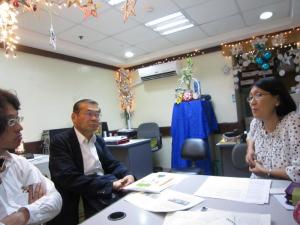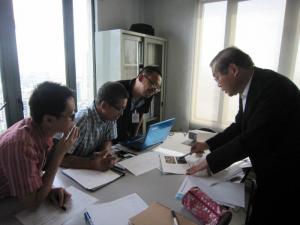Home > International Cooperation > Fiscal Year 2012 > Supporting Japanese companies for enhancing environmental technology transfer - December Visit to the Philippines
Main content starts here.
Update:November 14, 2013
Supporting Japanese companies for enhancing environmental technology transfer - December Visit to the Philippines
As part of a fiscal 2012 Ministry of Economy, Trade and Industry-commissioned program, ICETT provided support for Japanese companies which intended to transfer environmental technology to developing countries in Asia. As an example, ICETT supported a Japanese company which sought to transfer to Cebu City its own knowhow on the construction, operation, and management of facilities for biogas power generation that use methane from fermenting food waste.
On the first visit to the Philippines in October with the Japanese company, a local waste management company in Cebu was chosen as a partner with the help of the Philippine Department of Science and Technology (DOST) and a local consultant.
From December 2 to 6, members of the Japanese company and ICETT staff visited Cebu again to draw up a business model with the local partner company. In a meeting, the visiting group and the partner discussed a rough concept of a process in the city from the collection and sorting of organic waste, methane fermentation, gas collection, power generation, and to sales. The group also visited a possible site to construct a power generating facility and decided to use the land where the partner company’s waste sorting and recycling facility is located, close to the landfill site.
The key to the construction of the facility was to keep the cost down by using local resources, so in a meeting with a local engineering company, the discussion was made on how much of the facility design and building material procurement can take place in Cebu. Arrangements to draw up a cost estimate were also made.
Consultation will continue with the local partner, the engineering company, and the consultant to gather details on the local situation and other relevant information until, before mid-February, a business model was finalized.
It is necessary to receive cooperation from the Cebu government to transfer the Japanese technology to the city, and during this visit to the city there was an opportunity to meet a Cebu municipal assembly member who is supportive of this project.
Today, it is prohibited to incinerate waste not only in Cebu but also in the entire Philippines. All the local governments are confronted with serious problems, such as solid waste disposal, a shortage of waste disposal facilities, and the polluted environment surrounding these facilities. These governments, therefore, have started efforts to actively tackle these issues.
In these circumstances, the Japanese technology attracts a great deal of attention from the Department of Science and Technology (DOST) as well as the Cebu municipal government, since solid waste can be converted into energy with the use of this technology. In the meeting, the municipal assembly member promised that the local government will provide as much support as possible for the future projects.
 Meeting with a Cebu municipal assembly member
Meeting with a Cebu municipal assembly member
 Conferring with a local consultant
Conferring with a local consultant







